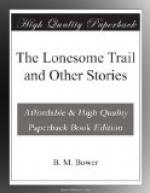The delinquents were not “top hands,” it is true. They—the Happy Family, of which Jim Whitmore was inordinately proud—would sooner forswear their country than the Flying U. But even two transients of very ordinary ability are missed when they suddenly vanish in shipping time, and Chip, feeling keenly his responsibilities, rode disgustedly into town to reclaim the recreants or pay them off and hire others in their places.
With his temper somewhat roughened by the agent’s report that no cars were yet on the way, he clanked into Rusty Brown’s place after his deserters. One was laid blissfully out in the little back room, breathing loudly, dead to the world and the exigencies of life; him Chip passed up with a snort of disgust. The other was sitting in a corner, with his hat balanced precariously over his left ear, gazing superciliously upon his fellows and, incidentally, winning everything in sight. He leered up at Chip and fingered ostentatiously his three stacks of blues.
“What’n thunder do I want to go t’ camp for?” he demanded, in answer to Chip’s suggestion. “Forty dollars a month following your trail don’t look good t’ me no more. I’m four hundred dollars t’ the good sence last night, and takin’ all comers. Good money’s just fallin’ my way. I don’t guess I hanker after any more night guardin’, thank ye.”
“Suit yourself,” said Chip coldly, and turned away.
Argument was useless and never to his liking. The problem now was to find two men who could take their places, and that was not so easily solved. A golden-haired, pink-cheeked, blue-eyed young fellow in dainty silk negligee, gray trousers, and russet leather belt, with a panama hat and absurdly small tan shoes, followed him outside.
“If you’re looking for men,” he announced musically, “I’m open for engagements.”
Chip looked down at him tolerantly. “Much obliged, but I’m not getting up a garden-party,” he informed him politely, and took a step. He was not in the mood to find amusement in the situation.
The immaculate one showed some dimples that would have been distracting in the face of a woman. “And I ain’t looking for a job leading cows to water,” he retorted. “Yuh shouldn’t judge a man by his clothes, old-timer.”
“I don’t—a man!” said Chip pointedly. “Run away and play. I’ll tell you what, sonny, I’m not running a kindergarten. Every man I hire has got man’s work to do. Wait till you’re grown up; as it is, you’d last quick on round-up, and that’s a fact.”
“Oh! it is, eh? Say, did yuh ever hear uh old Eagle Creek Smith, of the Cross L, or Rowdy Vaughan, or a fellow up on Milk River they call Pink?”
“I’d tell a man!” Chip turned toward him again. “At least I’ve heard of Eagle Creek Smith, and of Pink—bronco-fighter, they say, and a little devil. Why?”
The immaculate one lifted his panama, ran his fingers through his curls, and smiled demurely. “Nothing in particular—only, I’m Pink!”




